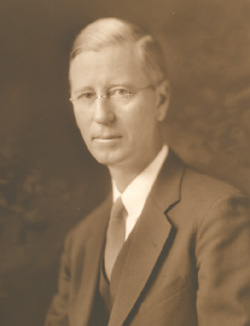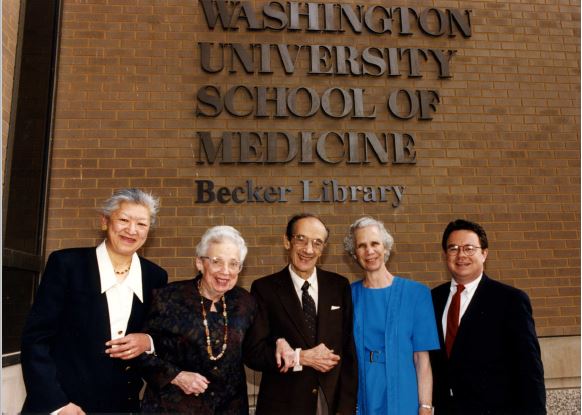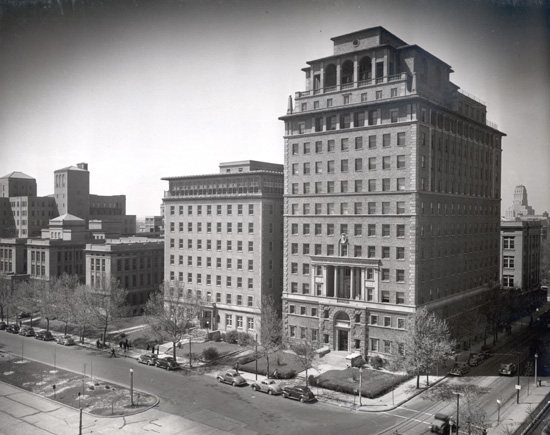
100th Anniversary Media Request
Help us celebrate our 100 year anniversary.
With our 100th anniversary just around the corner, we need your help. We would like to collect media memorabilia from our alumni, faculty, and staff to use in a celebratory documentary/presentation. Please submit your media using this form.
The department of Ophthalmology at Washington University School of Medicine was established in 1928, with Harvey J. Howard, M.D. as the first full time chairman.

In 1927, Howard was contacted by Washington University School of Medicine asking him to serve as the first Chair of the Department of Ophthalmology. Dr. Howard accepted the position and was instrumental in the construction of a new building devoted to ophthalmology. In this new building, Dr. Howard built a squash court and luxurious living quarters on the 13th floor. It is also reported that the letters “HH” are noted on the façade of the building.
During Dr. Howard’s tenure, he was responsible for the development of a resident training program in ophthalmology, which was in place by 1930, and conducted research on trachoma among the Indians and aviation medicine. Dr. Howard entered private practice in 1934 with offices in the Park Plaza Hotel in St. Louis, Missouri.
In 1929, Mrs. Eliza McMillan bequeathed over one million dollars to establish an eye, ear, nose and throat hospital at the University. During the same year, the Oscar Johnson family donated five-hundred thousand dollars for an institute of research and teaching in ophthalmology and otolaryngology, and the Rockefeller Foundation provided 1.2 million dollars for an endowment to begin a department of ophthalmology and otolaryngology at the University.
The cornerstone of the McMillan building was laid on May 14, 1930, with construction being completed in 1943. The building housed the department’s largest patient office for 58 years.




The department’s most notable faculty member is Dr. Bernard Becker, who became head of the department in 1953. In 1954, Dr. Bernard Becker developed the first orally-administered drugs for glaucoma, which was a research interest of his over the course of his tenure at WUSM. In 1967, the first Glaucoma Research center funded by the National Institute of Health was established with Dr. Becker.
Bernard Becker’s achievements extended outside the realm of ophthalmology, as he also played a major role in the design and construction of the Medical Library on the Washington University Medical Campus, which was finished in 1989, and named after him in 1995. Dr. Becker was also a major contributor to the Becker Library’s Rare Books collections, having donated his own personal collection. Those materials, the Bernard Becker Collection in Ophthalmology and Optics, are now housed in Becker Library’s Archives and Rare Books Department.
The ophthalmology department received multiple grants throughout the 1980s, including annual grants from Research to Prevent Blindness, which in 1990 had accumulated to $601,900. Additionally, in 1983 the Storz Fellowships in Ophthalmology were established due to an endowment of $880,000.
In 1995, the retina service of Washington University merged with Retina Consultants to become the Barnes Retina Institute. The same year brought the publication of Dr. Benjamin Milder’s history of the ophthalmology department, “On the Shoulders of Giants”. Dr. Milder was a St. Louis area ophthalmologist.
In 2018, a donation of $10 million from a Washington University alumna, Jane Hardesty Poole, re-established the department of ophthalmology as the John F. Hardesty Department of Ophthalmology, after Poole’s father, the ophthalmologist Dr. John F. Hardesty.
Poole, said that in making the gift, she wishes to honor her father’s distinguished service to his profession and his deep commitment to patients and families affected by vision loss.
“My father exemplified the best of what a doctor should be,” Poole said. “On top of his great ability, he was caring and was generous with his time, talent and resources. I am delighted to be able to honor his memory in a way that will advance the important work taking place in the department and ensure exceptional care for patients and families.”
Jane Hardesty Poole
Department Chairs
- 1928-1933: Harvey J. Howard, M.D.
- 1933-1953: Lawrence T. Post, M.D.
- 1953-1988: Bernard Becker, M.D.
- 1988-1999: Henry Kaplan, M.D.
- 1999-2014: Michael Kass, M.D.
- 2014-Current: Todd P. Margolis, M.D., PhD